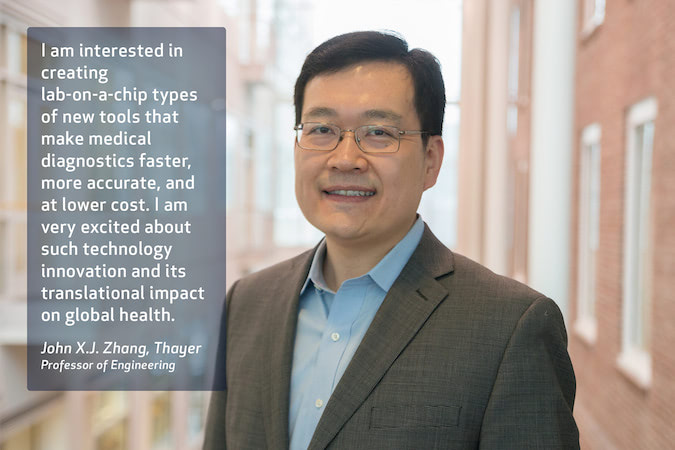- Undergraduate
Bachelor's Degrees
Bachelor of ArtsBachelor of EngineeringDual-Degree ProgramUndergraduate AdmissionsUndergraduate Experience
- Graduate
Graduate Experience
- Research
- Entrepreneurship
- Community
- About
-
Search
All Thayer News
Professor John Zhang Receives NIH Transformative Research Award
Oct 18, 2016 | National Institutes of Health
The High-Risk, High-Reward Research (HRHR) program, supported by the National Institutes of Health (NIH) ’s Common Fund, awarded 88 grants to highly creative and exceptional scientists with bold approaches to major challenges in biomedical research. The awards span the broad mission of the NIH and include groundbreaking research: engineering immune cells to produce drugs at sites of diseased tissue, developing a sensor to rapidly detect antibiotic resistant bacteria, understanding how certain parasites evade host detection by continually changing their surface proteins and developing implants that run off the electricity generated from the motion of a beating heart.
As part of this program, Professor Zhang is one of NIH's 2016 Transformative Research Award recipients. His project title is, "Implantable Cardiac Power Generation Using Flexible 3D Porous Thin Films."
NIH traditionally supports research projects, not individual investigators. However, the HRHR program seeks to identify scientists with ideas that have the potential for high impact, but may be at a stage too early to fare well in the traditional peer review process. These awards encourage creative, outside-the-box thinkers to pursue exciting and innovative ideas in biomedical research.
The NIH Common Fund supports a series of exceptionally high-impact programs that cross NIH Institutes and Centers. Common Fund programs pursue major opportunities and gaps in biomedical research that require trans-NIH collaboration to succeed. The High-Risk, High-Reward Research program, part of the NIH Common Fund, manages the following four awards:
- The Pioneer Award, established in 2004, challenges investigators at all career levels to pursue new research directions and develop groundbreaking, high-impact approaches to a broad area of biomedical or behavioral science.
- The New Innovator Award, established in 2007, supports unusually innovative research from early career investigators who are within 10 years of their final degree or clinical residency and have not yet received a research project grant or equivalent NIH grant.
- The Transformative Research Award, established in 2009, promotes cross-cutting, interdisciplinary approaches and is open to individuals and teams of investigators who propose research that could potentially create or challenge existing paradigms.
- The& Early Independence Award, established in 2010, provides an opportunity for exceptional junior scientists who have recently received their doctoral degree or completed their medical residency to skip traditional post-doctoral training and move immediately into independent research positions.
Link to source:
For contacts and other media information visit our Media Resources page.

